Invest Real Estate No Money
We all know it takes money to make money. And especially in real estate investing, it's almost impossible to get started with less than a 20% down payment and a big wad of cash.
Right?
Well, not exactly.
Conventional wisdom isn't always right.
It's certainly easier to get started in real estate if you have cash. And if you eventually want to reach financial independence the fastest way, you do need to save a LOT of money.
But the truth is that in every business – including real estate investing – entrepreneurs get started every day with little money. Many of them simply get off the ground by having a strong dream and applying a whole lot of hustle.
How do I know this? Because that's what I did! And I've also taught and coached others who've done the same thing.
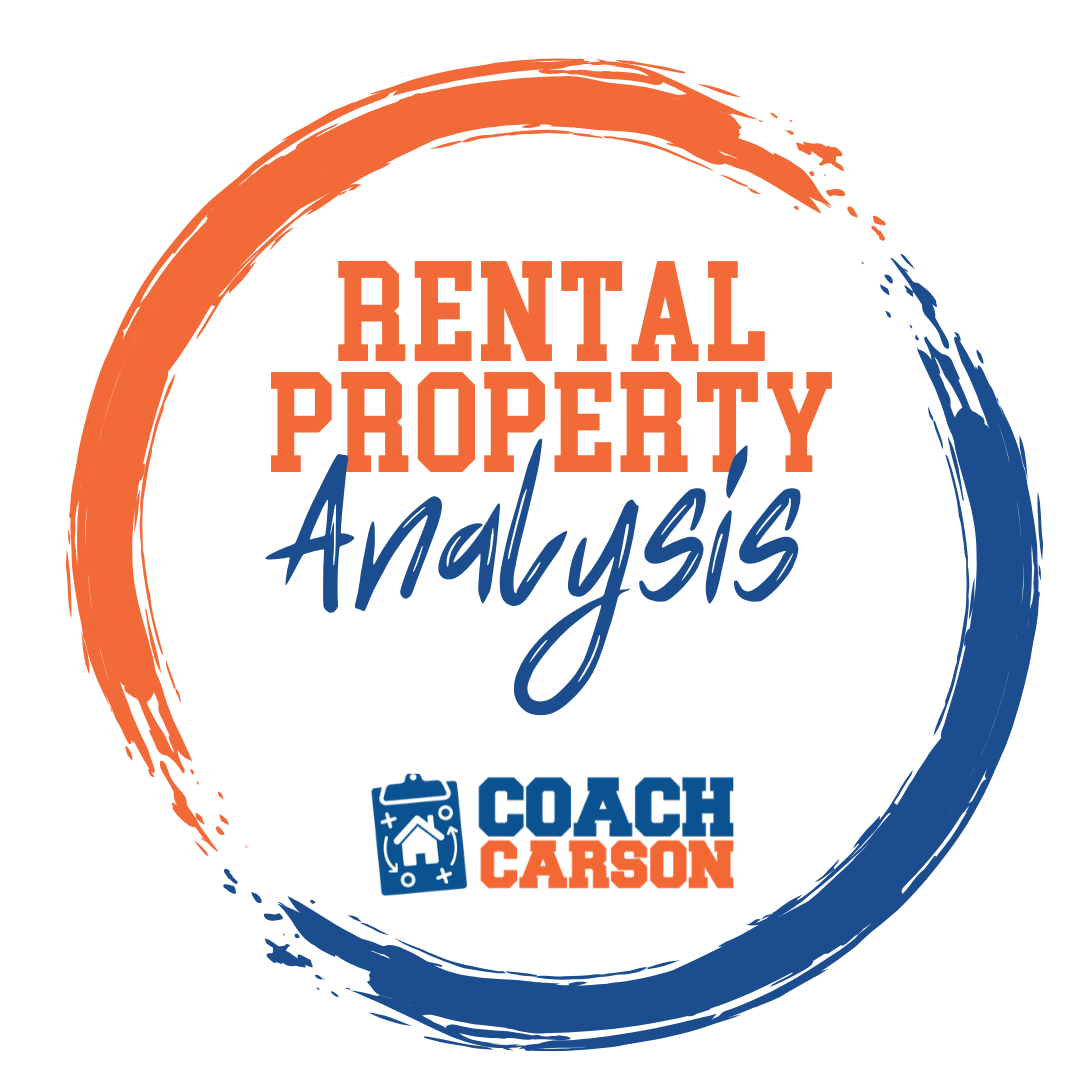
Rental Property Analysis
A course by Coach Carson that teaches you how to run the numbers so that you can confidently analyze and buy profitable rental properties. It also includes Coach's rental analysis spreadsheet.
Get the Course
And in this article, I want to show how you can do it too.
Outline of Topics
Below you'll find 15 different ways to get started with little or no cash as a real estate investor. You can skip ahead by clicking on the link to each strategy.
- House Hacking
- Master Leases & Lease Options
- Live-In House Flips
- Live-In-Then-Rent
- Real Estate Crowdfunding
- REITs (Real Estate Investment Trusts)
- Airbnb
- Partnerships
- Seller Financing
- BRRRR Strategy
- Borrow Your Down Payment (CAREFULLY!)
- Real Estate Agent
- Bird dog (sniff out deals for others)
- Wholesaling
- Leasing Agent
But first, I want to briefly explain why real estate investing is worth your time.
Why You Should Consider Real Estate Investing
Real estate is the I.D.E.A.L. investment and has many benefits. When you own investment real estate, you make money from income, depreciation, equity build-up, appreciation, and leverage.
And I also love that real estate investing is a hybrid between a small business and pure investment. While not always easy, it is possible to start and grow a real estate investing business from scratch.
Then once your business matures, you can live off your investment income for the rest of your life. And that means work becomes optional and you can do whatever matters most with your time.
Sound good? Ready to get started?
15 Strategies to Get Started in Real Estate Investing With Little or No Cash
Here are the 15 options to invest in real estate with little or no money.
1. House Hacking
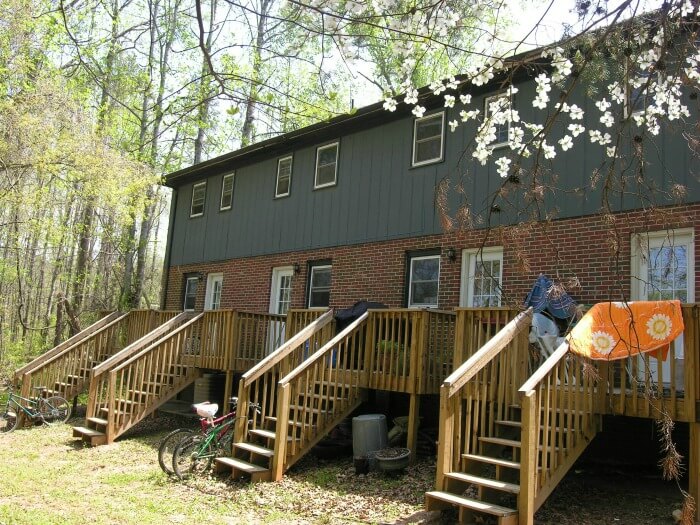
House hacking is one of my favorite ways to start investing in real estate. It basically means you figure out a way to generate rental income from your home.
A classic house hack is moving into a small multi-unit property, like a duplex, triplex, or 4-plex. Then you rent out the extra units for income.
You can also get creative by renting out extra bedrooms to roommates, renting out a basement apartment or guest house, or even renting extra space on your lot to an RV (if your local laws allow it).
And all of this can be started with little money down because you can obtain owner-occupant financing to buy the property. Here are a few loan programs with small down payments that you can use for house hacking:
- FHA loan (3.5% down)
- VA loan (0% down for veterans)
- USDA (0% down in rural areas)
- Conventional loans (3% to 10% down with mortgage insurance)
With a $200,000 property, for example, this means you may put $0 to $7,000 down with some of these programs!
>> Want to get started? Check out my house hacking guide. <<
2. Master Leases And Lease Options
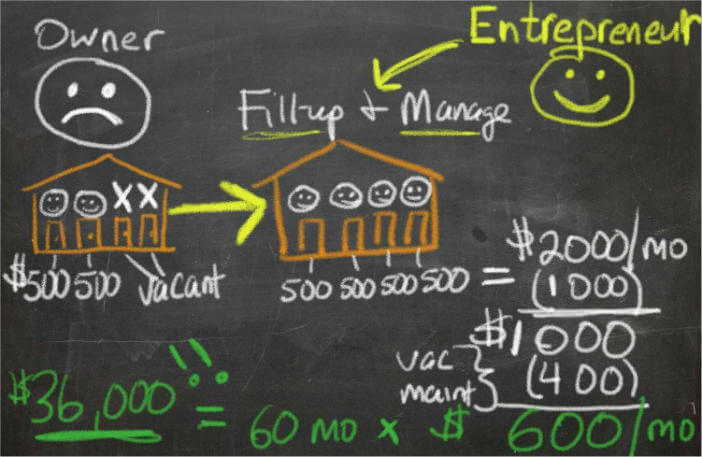
Did you know that you don't need to buy a house in order to get started with real estate investing? Instead, you can just rent it.
Master leasing is a technique where you rent a property and get permission from the owner to sublease the extra bedrooms or units to other tenants.
For example, let's say you rent a 3-bedroom condo for $1,500/month. You then find two roommates who each pay $600/month for a total of $1,200/month. Your portion of the rent in this example is only $300 per month ($1,500 – $1,200)!
And like most rentals, master leasing can often be negotiated with very little upfront money – perhaps a security deposit, prepaid rent, or an offer to do some repairs.
And while just master leasing might be good enough in some cases, you can also try to negotiate what's called an option to purchase. This gives you the right to buy the property for a set price during a certain period of time.
For example, you might negotiate an option price of $175,000 for the condo in the prior example for a 3 year period. If the price goes up to $200,000 during that time, you can then buy the property in order to keep it or you could flip it someone else for a profit.
And all of that happened for a small up-front amount of money!
>>Want to use master leasing + options? Check out my YouTube video example.<<
3. Live-In House Flip
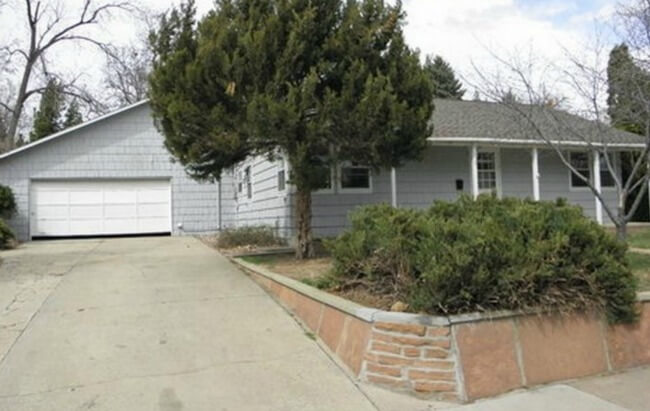
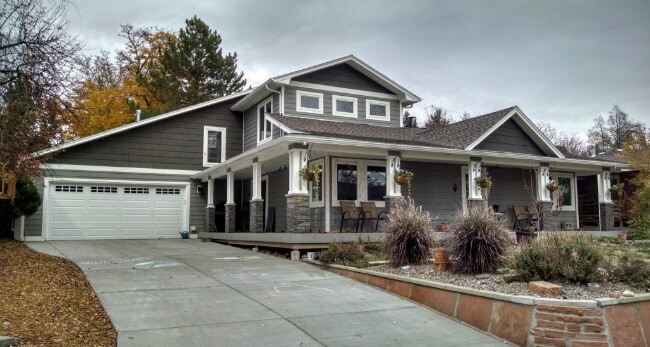
Have you seen the house flipping shows on TV? Ever wanted to do that for yourself?
One of the best ways to get started with flipping is by turning your home into a flip. This technique is called the "Live-In Flip." It takes advantage of one of the most profitable tax laws in the U.S.
It works by buying a home, moving in, and living there for at least 2 out of 5 years. Then you can sell the home for a profit and pay no taxes up to $250,000 as an individual or $500,000 as a couple who files taxes jointly.
That is a HUGE amount of profit tax-free! How long would you have to work in order to earn that much money after tax?
And like every strategy, it doesn't come without some work and risk. But because you live in the house, you can reduce your risk by taking your time with repairs and waiting for the perfect time to sell.
You can also use the same low-down-payment loan programs for Live-In Flips that I explained in the house hacking example.
My friends Carl and Mindy Jensen used Live-In House Flips to build several hundred thousand dollars of net worth early in their working careers. They then invested and grew this nest egg into over $2 million that allowed them to retire in their early 40s.
>> Want to learn more about Carl and Mindy's story with Live-In Flips? See Getting Rich With the Live-In Flip <<
4. Live-In-Then-Rent
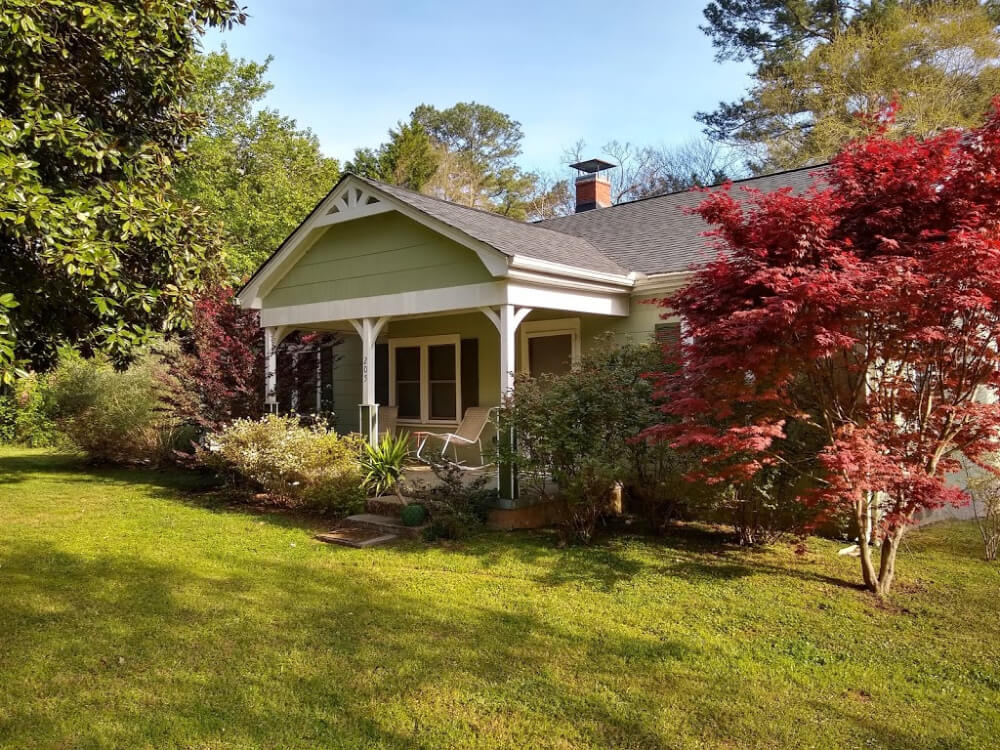
The Live-In-Then-Rent technique is a close cousin of house hacking. Essentially, you move into a house, get it ready to rent, and then keep it as a rental later on when you move out.
To make this strategy work, you'll need to buy a more modest house that will also work financially as a rental.
Like house hacking, you can benefit from the small-down-payment loans for owner-occupants. But unlike a house hack, you don't have to live next door to your tenants!
And because a house is typically bigger than an apartment, it makes this technique more beneficial to people with families.
Doing just 3 or 4 Live-In-Then-Rent properties can set you up with a nice portfolio of rentals for many years to come.
>> Interested in the Live-In-Then-Rent strategy? See my own Live-In-Then-Rent Case Study <<<
5. Real Estate Crowdfunding
Real estate crowdfunding is a relatively new entry into the real estate investing world. It allows you to invest a smaller amount of money (like $1,000 to $5,000) alongside a group of other investors (i.e. the crowd).
These crowdfunded investments can be rental properties (usually larger multi-unit properties) or loans to other real estate investors (i.e. hard money loans).
I have been experimenting with this strategy on my own for a couple of years. But because the legal structure and companies are so new, I'm still a little cautious.
For example, my business partner had some money with a company called RealtyShares, and they basically shut down their business last year. No money has been lost (yet!), but it shows the risk of investing with start-up companies that are strapped for cash.
So this means that while I like the overall concept, I'm keeping my investment to a relatively small percentage of my net worth, and I'm spreading it around to different companies for now.
A few of the companies I have my eye on or have invested with so far include:
-
- Peer Street – residential loans to other investors that typically earn 7-8% interest
- Equity Multiple and Crowdstreet – pre-vetted commercial projects or diversified portfolios of commercial projects
*These may be affiliate links, which means my site earns a small commission (at no cost to you) if you use their service. Thank you!*
In these particular cases, you must be an accredited investor in order to invest. This means you must have a net worth exceeding $1 million (without your home) and/or an annual income of over $200,000 for the last two years (or $300,000 for a couple).
There are other crowdfunding platforms like Fundrise.com that do not require you to be accredited. But the investment style is slightly different, and it's more similar to a REIT – which I'll talk about next.
6. REITs (Real Estate Investment Trusts)
Real estate investment trusts (i.e. REITs) are very similar to mutual funds. When you buy stock in a REIT, you own a small piece of many commercial, income-producing properties. A team of managers picks and supervises the investments within the REIT for a fee.
Similar to real estate crowdfunding, REITs are a truly passive investment once you buy it. But unlike crowdfunding, shares of a REIT are much more liquid – which means you can sell them quickly (like a stock or mutual fund) in order to raise cash.
REITs are not my specialty, and they are not something I have invested in personally. But you can get a good introduction to REITs in Where Do REITs Fit in a Portfolio and When Is the Right Time to REIT?
7. Airbnb
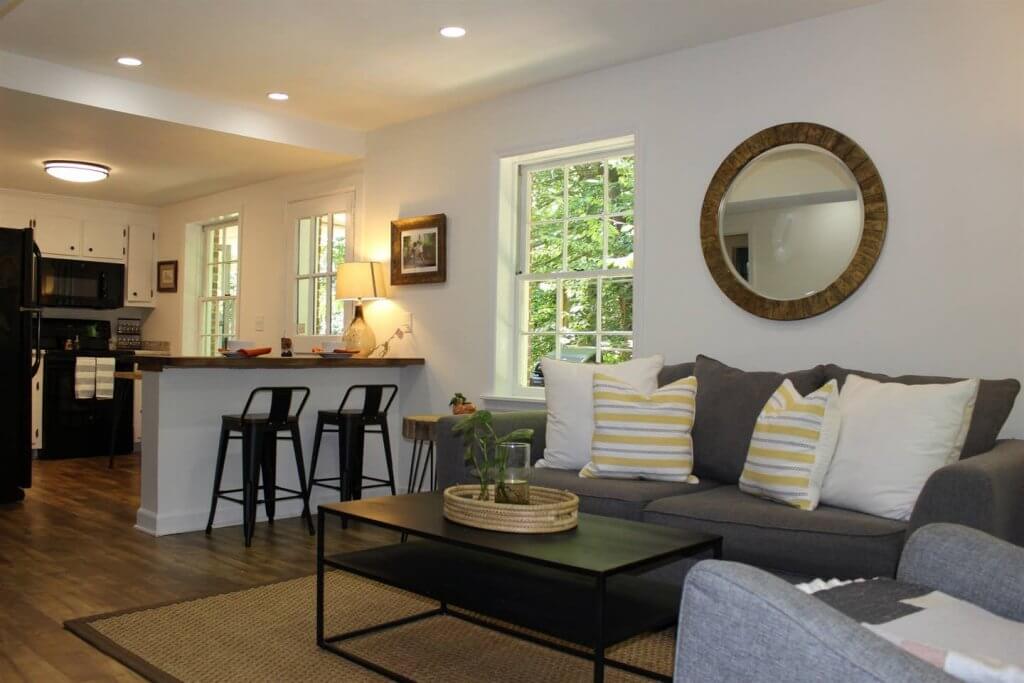
Airbnb is the mega-online marketplace that lets you rent out your home (or part of your home) for short periods of time. And you can use it as a low-cost way to get into real estate investing.
My wife and I regularly stay in Airbnb apartments when we travel because we love having our own kitchen and space. And we also recently decided to become a host by turning our basement apartment into a short-term rental that generates extra income.
For most of you, this strategy could be a specialized form of house hacking where you generate income from your home or part of your home. But you could also grow it into a real business that generates a part-time or full-time income.
>> Want to become an AirBnb real estate investor? Listen to this BiggerPockets Podcast episode with Zeona McIntyre, who uses short-term rentals to retire early. <<
8. Partnership
When you don't have the money yourself for a real estate investment, you can still get started by using money from a partner.
While there are many ways to partner, one of the simplest is something called a credit partnership. It basically works like this:
- You find a good real estate investing deal.
- Your credit partner puts up the down payment and gets a loan to buy the property.
- You lease the property from your credit partner with an option to buy it at a higher price.
- You sublease the property to a tenant, handle all the day-to-day management issues, and keep the difference between the rent you collect and the rent you pay.
- Before your option to purchase expires, you can get a new loan to purchase the property yourself (hopefully after the property has appreciated in value). Or instead, you could sell your interest in the property to a new buyer at a marked-up price.
By using your brain and your hustle to put a deal together, you can essentially control the income and the appreciation of the property with very little money (perhaps a $100 to $1,000 option fee). I did several of these deals early in my real estate investing career when I had limited funds.
>> Want to learn more about credit partnerships? See my detailed guide and YouTube video <<
9. Seller Financing
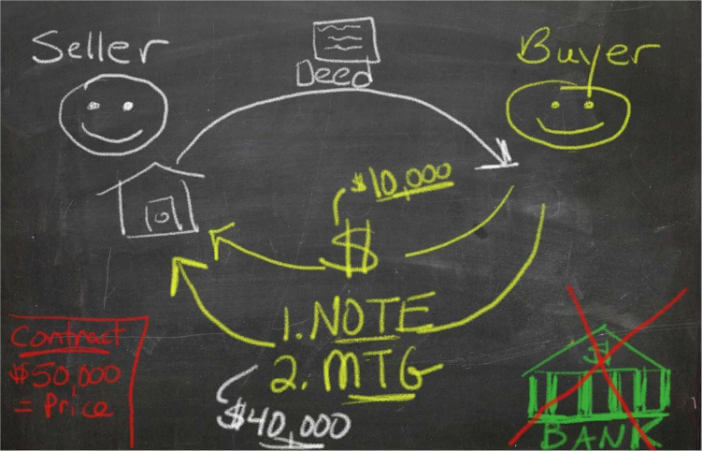
Seller financing is an approach to purchasing real estate where the seller can "become the bank" for you. Instead of getting a loan from a bank, the seller lets you purchase the property over time using monthly installments.
This is one of my favorite ways to buy real estate because these individuals aren't bound by traditional bank lending requirements. Whatever terms you negotiate with the seller are what you pay.
It doesn't always happen, but it is possible that you could negotiate a lower down payment with a seller. This is especially true if a property needs repairs because you can sometimes trade your sweat equity (i.e. your labor) instead of making a monetary down payment.
>> For more details on seller financing, see The Ultimate Guide to Using Seller Financing (aka Owner Financing) to Buy Real Estate
You can also learn more about something called "subject-to investing," a close cousin to seller financing, on my Subject-To Investing YouTube Video.
10. BRRRR Strategy
BRRRR stands for Buy, Remodel, Rent, Refinance, Repeat.
Like flipping houses, it's all about finding fixer-upper properties, remodeling them, and increasing their value. But instead of selling, you keep the property as a rental and refinance to pull out some or all of your cash.
This plan is most useful when you're trying to grow your rental portfolio rather quickly. Instead of running out of cash for upfront costs on multiple properties, you can carefully refinance to pull out your cash and recycle the funds to buy several properties in a row.
Here's how the process works:
- B – Buy a property that has potential to increase its value with repairs. Typically you'll use short-term purchase financing, like cash, a line of credit, private money, or hard money.
- R – Remodel the property to increase its value and make it rentable
- R – Rent the property to a quality tenant (or tenants)
- R – Refinance using a long-term mortgage
- R – Repeat (if desired)
This is a technique that many investors have used for a long time (myself included), but my friend and fellow BiggerPockets author Brandon Turner was kind of enough to name it several years ago so that we could all remember it!
And David Greene, co-host of the BiggerPockets podcast, wrote a book about BRRRR investing that you should check out if you find this strategy interesting.
11. Borrow Your Down Payment (CAREFULLY!)
This is one of those strategies I considered not including in the list because I'm not a big fan of borrowing money for down payments. The interest you must pay on these borrowed funds usually creates negative cash flow from the very beginning.
BUT if you do it carefully and pay the funds off quickly, it could be a way to help you get started.
For example, if you have a home equity line of credit (aka HELOC), you could borrow money on the equity of your home for a down payment or for the entire purchase of the investment property. You could then work on paying the funds back quickly from savings and/or income from the property.
Or another example, you may be able to borrow up to $50,000 from your own 401k funds. You will have to pay yourself interest AND you will have to pay the money back in a reasonable period of time. But paying yourself interest is better than paying a bank!
I shared an example of a student of mine who used borrowed 401k funds to get started with one of his first multi-unit purchases.
12. Become a Real Estate Agent
To begin learning and earning money, you could start a side business or full-time career as a real estate agent. While technically not investing, it's a great way to learn about real estate transactions and the overall real estate market.
Every state is a little different, but you typically have to take a certain number of classes up front (I took 30 hours in South Carolina). Then you take a comprehensive test and pay your licensing dues with the state.
Additionally, you'll typically need to find a broker's office to "hang your license" with. There are many different types of firms and different business models, so you'll have to find one you're comfortable with.
And finally, most agents also join their local Association of Realtors and pay for access to the Multiple Listing Service.
The initial investment could cost between $1,000 – $2,000. But you'll need to invest additional time and energy into lead generation marketing in order to start making some money.
If you want to pursue this career, I recommend starting with the book Millionaire Real Estate Agent by Keller Williams founder Gary Keller.
You can also check out this YouTube playlist from Graham Stephan, who is a successful agent and investor in Los Angeles, California.
13. Become a Bird Dog (aka Sniff Out Deals For Others)

I began my career by finding good real estate deals for another more experienced investor. This strategy is called being a bird dog because I "sniffed out" and "pointed to" deals like a bird hunting dog.
I didn't need much money or experience to get started. I lived at home and used my time and energy to find a lot of the deals.
In order to legally earn finder's fees as a bird dog, you'll need to have your real estate license in most cases. So, this is really a specialized form of being a real estate agent. But instead of focusing on all buyers, you just focus on investor buyers.
This strategy is very simple in principle. You just need to do two things very well:
- Find good deals
- Find several active investor buyers with money
You can learn the exact ways I found 33 deals in one year.
And I recommend finding your buyers at local real estate investing associations (i.e. REIA groups) or on BiggerPockets local forums.
14. Wholesaling
Wholesaling is the business of finding deeply discounted deals and quickly reselling them for a profit to other bargain hunters. In many cases, you can use very little money but still make a profit on a wholesale deal.
Wholesaling and being a bird dog are slightly different. With wholesaling you actually get the property under contract or buy it before reselling it for a profit. But as a bird dog, your investor buyer is the one who buys the property. You then earn a fee.
After my first year as a bird dog, I actually evolved into the business of wholesaling. It was a natural progression as I got good at finding deals.
But as much as I liked it, wholesaling is not the perfect beginner business model it's often promoted to be. I've found the results to be mixed for new investors.
The problem is that wholesaling is a sales business. This means you have to be good at making lots of offers and getting rejected a LOT. But if you're good at sales, I actually think being a real estate agent (strategy #11) is an easier and lower risk way to make money at first. You can then evolve into wholesaling or add it on to your existing agent business later.
But wholesaling can still be a great business model for those who are ready. If it sounds fun or like something you'd be good at, here are a couple of online teachers I've found helpful:
- Max Maxwell YouTube Channel
- Seth Williams Guide to Wholesaling
15. Find Tenants For Rental Owners (aka Leasing Agent)
If you want to eventually become a rental owner but don't have the cash yet, consider becoming a leasing agent to earn money while learning the business.
As a leasing agent, you help to match a tenant with a particular rental unit. And you earn a fee – often 50% to 100% of a month's rent – in exchange for your time.
I love this business model for future rental owners because you learn how to find and screen tenants, which is one of the essential skills of being a landlord. And you do it while earning money and taking very little risk yourself.
In most cases, you would work for a property management company in order to become a leasing agent. But you could also get your real estate license and just contact individual landlords to do their tenant placement for them.
As a rental owner who enjoys landlording from a distance while traveling, I promise you that this is a valuable service!
Other Frequently Asked Questions About Investing in Real Estate With Little Money
You've now learned 15 different ways to start investing in real estate with little or no money! If you've found a strategy that works for you, go ahead and get started right now!
But I also know that some of you will have some additional questions. So, I've collected some frequently asked questions and done my best to address them below.
How Much Money Do You Actually Need to Start Investing in Real Estate? Can You Start With as little as $1,000?
So you want to get specific with the amount of money, do 'ya?! I got started with only $1,000 in my bank account. So, I understand where you're coming from.
Let's look at a few different scenarios that could work.
If you want to invest passively in a REIT or real estate crowdfunding, it's possible to dip your toe into real estate investing for as little as $500 to $1,000.
Or, if you're willing to invest a LOT of time and energy, you could probably get started with one of the active real estate businesses like bird dogging, wholesaling, or becoming a real estate agent for between $500 to $2,000 upfront.
And if you want to buy a property directly, your best bet is one of the owner-occupant strategies like house hacking or live-in-then-rent. These will allow you to get an owner occupant loan, which in the case of a VA loan has a 0% down payment or in the case of an FHA loan has 3.5% down payment.
You could also try more creative strategies like lease options, subject-to investing, or seller financing.
But remember that down payment is not your only cost when buying a property directly. You also have closing costs, repair costs, and reserves that require additional cash. That is why owning a property directly with only $1,000 in the bank is probably not a good idea.
Is It Possible To Buy Property With No Money Down?
It is possible to buy a property with no money down if you use the right type of financing.
For example, a VA loan (veterans administration loan for military veterans or active members) has a 0% down payment requirement. And a USDA (US Department of Agriculture) loan has a 0% down payment requirement for properties in qualifying rural areas.
I've also bought or controlled properties for no money down with creative financing strategies, like seller financing, lease options, and credit partnerships.
And perhaps the most popular form of investing with no money down is the BRRRR (Buy, Remodel, Rent, Refinance, Repeat) Strategy. I like this approach because the low entry price of your purchase builds in equity (and lowers your risk) even though you pull out most or all of your down payment through a refinance.
Can I Invest in Real Estate With No Money and Bad Credit?
Not all of us start with an easy financial situation. Perhaps you have little money saved, and you have bad credit from a past financial challenge.
If you find yourself with bad credit and little money, you have two primary options to get started with real estate investing.
- You can start a part-time or full-time job within real estate like bird dogging, a real estate agent, wholesaling, or a leasing agent. These are all good options because you earn while you learn. I explained each of these options in the sections above.
- You can also use creative financing strategies to buy or control real estate. Because you're not applying for a loan with a bank, a seller or private individual may be more lenient with credit. These strategies include seller financing, lease options, master leasing, credit partnerships, private money, and hard money.
While all of these options are possible, also keep in mind that saving money and fixing your credit should be a priority. Make it your goal to not HAVE to invest with bad credit or little money down in the near future!
Your Turn To Get Started!
Are you ready to start investing in real estate, even if you have little or no money? I hope you've found the ideas in this article helpful.
I got started investing in real estate investing with very little money. And I remember how challenging it was.
Your own journey probably won't be easy either. But if you apply your favorite ideas from this article and combine them with persistence, energy, and a lot of hustle – it IS possible to make real estate investing work for you too!
Best of luck in your real estate investing journey!
Which of these ways to start with little or no money makes the most sense for you? I'd love to hear from you in the comments below.
Get My Free Real Estate Investing Toolkit!
Enter your email address and click "Get Toolkit"
Success! Now check your email to confirm your subscription.
Invest Real Estate No Money
Source: https://www.coachcarson.com/little-or-no-money/
Posted by: fischerporybouted.blogspot.com

0 Response to "Invest Real Estate No Money"
Post a Comment